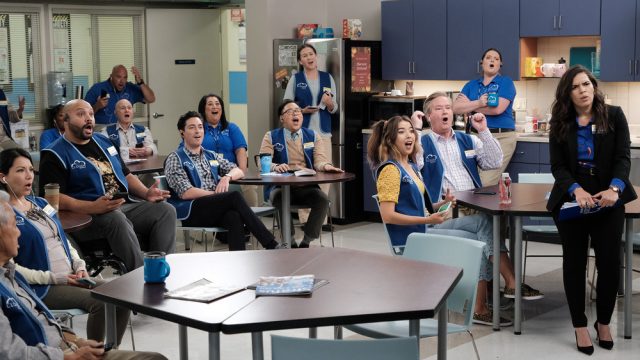NBC sitcom Superstore – at least the three seasons I’ve watched so far – dedicates itself to the classic joke structure, putting more time into setting up punchlines and funny gags so the character’s dramatic motivations and moments are quickly sketched out and fleshed out in part by the jokes. This is a good thing. The past ten years have held a glut of dramedies, especially in the wake of Bojack Horseman* and Transparent, that have funny moments but are more concerned with narrative than (god forbid) entertainment.
This is not to say these characters don’t have depth, or that Superstore breaks the mold for a comedy. It’s a successful, funny ensemble-based sitcom in a store setting with a good “Will they/Won’t they?” storyline. But it exemplifies what The Bear and Life & Beth typically miss out on: (1) your character’s motivations are dramatic and funny, and (2) you can take control of the tone, so the drama immediately follows the comedy, or vice-versa. The combination of genres actually heightens the whole mood here, leading to scenes like the aftermath of the tornado or Dina very casually agreeing to be Glenn’s surrogate.
One of the single funniest moments on the show so far arrives in Season 2 after one supporting character makes a heartbreaking decision because of his undocumented immigrant status. Nicos Santos is a good actor, and this is a strong dramatic beat – beautifully undercut by Jonah – unaware of what just happened – punching him in the fucking face to prove he can put up a fight, thus paying off the running A plot and creating a huge belly laugh. This is already the worst day of Mateo’s life, and now he’s injured and down on the ground. It’s great drama and great comedy, all in the space of 90 seconds.
This frequent balance of gag and dramatic beat works because by the end of the truncated first season, the Missouri Cloud 9 employees all feel locked in place (save Sandra and Carol, more prominent in Season 2 and magnificent dramatic characters in their quiet insanity). Glenn, the manager, wants to be a good Christian dad, but struggles with his own naivete about the world and repressed anger. Like Skinner in The X-Files, Glenn genuinely cares about his employees and is sometimes at odds with an institution that doesn’t really give a shit. This naivete is also why assistant manager Dina – maybe the most evolved character since the pilot – clashes with him and Garrett, the store announcer and the one giving “the Billings” every day. Dina doesn’t need to be liked, living in a near-neurodivergent social order of her own making where the store must be respected, and the rules must be obeyed. (There is a Dina in every retail store.) Garrett only cares up to a point but is genuinely outraged when accused of doing less than the bare minimum to avoid getting fired. The man has his standards.
Main characters Amy and Jonah meanwhile develop feelings for one another because they share the same basic motivations: they both want to be liked, and they want other people to be happy. (The biggest difference between them is privilege and Amy’s sense of responsibility – as Jonah rightly points out, Amy likes to play the martyr.) Both have “justice sensitivity” because of these motivations, and this innately brings them together and puts them in opposition to Cloud 9’s anti-union, minimum wage, indifferent corporate culture. I don’t know if the show bible always included the employees’ frustrations with Cloud 9, but it provides a good plot thread and unites the two genres: the gags about Cloud 9’s crappiness end up sparking action among the employees. The store is a crappy place, but it’s where they have to be every other day (“wherever you go, there you are”), and maybe they can make it better, one way or another.
* In all fairness, Bojack had some incredible gags, especially in the first few seasons. Thinking now of Hollywoo, J.D. Salinger’s celebrity quiz show, and Todd getting the rights to Diisneyland.


